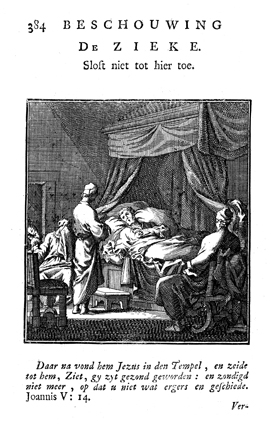The Ill One: Do Not Put Off until Now
Author: Luiken, Jan, 1649-1712
Image Title: The Ill One: Do Not Put Off until Now
Scripture Reference:
- John 5 (further images / scripture text)
Description: An ill man lying in bed talks to a person standing in front of him. A crying woman with a child next to her and another person sit in chairs next to his bed. The Dutch artist and poet Jan Luiken (1649–1712) was responsible for drawing this emblem and composed the poem that accompanies it. The etching was executed by Jan Luiken or his son Casper Luiken (1672–1708) who adapted this image from one used in an earlier work, which may be found in the Digital Image Archive under the call number 1699Weig. The attendant scripture text is John 5:14.
Motto: Neglected time, Begets pain from regret.
Poem:
He who recently blew his nose and sniffled spiritedly,
Is laid up groggy and stuffy
His color becomes pale, his gleam becomes dull,
Vanished with healthy days.
Where is the fruit of earthly joy?
Or has it born straw and chaff?
That is meager fodder, good for nothing,
And it leaves its Sower to lament with sorrow.
A fruit that not only does not feed,
But being naturally poisonous,
Gives an aftertaste like bitter soot,
That must sour the worldly desire.
The stunned little spark now gets air,
Which lying under the ash of the flesh,
Demands work that bears fruit,
And it shows the way to better paths.
Now the coarse flesh sinks in weakness,
The noble conscience raises itself,
That day by day urges for good.
And is year by year thrown away.
Now one detects the shameful neglect,
And intends to lead a better life;
But when the flesh gets room again,
The spirit is again dispelled.
Health conquers the house again,
And good intentions are again postponed,
By the submissive family,
Bad behavior raises its head again.
It is thus, like one saw earlier,
The night, given over to sadness
Disappears again in the day of health,
To feed again the old desires.
So that, when the ill one became healthy again,
He was, according to the word of the old one,
Worse than he was earlier;
Where is he who viewed it differently?
Repent thee then at the right time,
During good and healthy days,
So that thou preparest better ground,
That does not sink through fits of evil,
See, if thou dost wish to be wise and thoughtful,
Then learn that firm rule,
That thou, also in thy full strength,
Art always possessed by illness.
And even, from thy birth on,
Until this hour, art inclined to die,
By the law that all flesh must inherit.
This life then, of this Time,
Is not health, as we regard it,
Because of imperfection,
So we pursue that same wellbeing,
In life, that is promised,
And that God wishes to give us as a favor,
Where nothing robs the Moderation,
That is the true healthy life.
We are then ill, in Body and Soul,
Let us obtain salvation through penitence,
So that our life would not fall,
Through this death into eternal dying.
If illness invites repentance,
Then let each one repent,
Before he is surprised by death,
That each then learns his condition and state:
For he who so turns in evil,
And thus has forgotten himself,
That he does not know his illness,
He is truly sadly and deeply possessed.
So illness is a state of distress,
Except for the state of the pious,
Who hope to come through the gate of death,
Into a better state and land:
They have considered themselves to be ill,
When others were happy and cheerful,
And have endeavored to find a cure,
That might keep them from regret.
When now the body fails them,
The spring of healing begins,
As the spiritual life is unpacked,
To be eternally healthy;
In the life in which one is eternally content,
And can be completely satisfied,
Since everything fits and everything suits,
And is raised above all evil.
(Translation by Josephine V. Brown, with editorial assistance from William G. Stryker)
.
Click here for additional images available from this book.
Request a high-resolution file (fees apply)
Rights Statement: The online edition of this work in the public domain, i.e., not protected by copyright, has been produced by Pitts Theology Library, Emory University.
Rights Status: No Copyright - United States
Pitts Theology Library provides copyright information as a courtesy and makes no representation about copyright or other legal status of materials in the Digital Image Archive.

